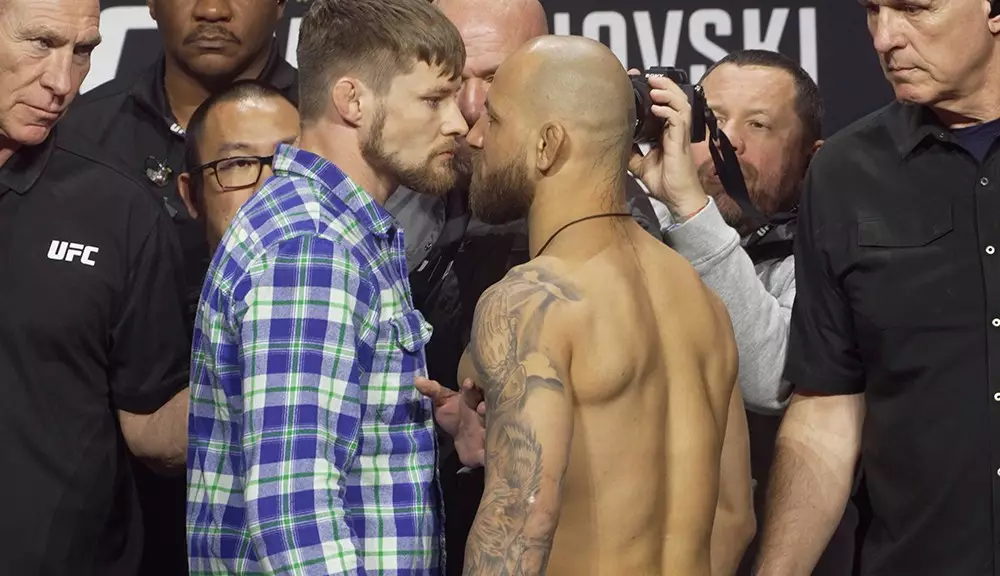As UFC 314 looms closer, Bryce Mitchell is not only preparing to face his opponent, Jean Silva, but also confronting a far more sinister adversary—his own nightmares. In the lead-up to this highly anticipated matchup, the fighter has shared that he feels tormented by visions of demons in his sleep, a phenomenon that has escalated since a press conference in Las Vegas on March 7. This unsettling experience speaks volumes about the mental toll that athletes endure, not just from physical training, but from psychological battles that often remain unseen.
Mitchell’s vivid reflections reveal a clear connection between sport and spirituality. His request for prayers from fellow Christians signals the intense pressure that accompanies a prominent fight, especially one that captures the imagination of the public. The disturbed sleep, filled with nightmares showcasing both fury and temptation, illustrates a complex intertwining of moral struggles and the stakes associated with fighting for one’s beliefs. The underlying message here resonates far beyond the octagon, spotlighting the mental health issues athletes often face, which are exacerbated by the high-profile nature of their confrontations.
Public Persona vs. Private Turmoil
Mitchell’s journey showcases the clash between his public image and his private life. His Instagram video, where he pleads for prayers, highlights a peculiar vulnerability rarely seen in the typically tough persona of a UFC fighter. This dichotomy presents an important conversation regarding masculinity within contact sports—where expressing fear or vulnerability is often stigmatized. By openly discussing his nighttime terrors, he challenges the stereotype that athletes must always exude relentless bravado, instead framing vulnerability as a strength, or at least a slice of authenticity that his fans can connect with.
Compounding the psychological turmoil is the clash he experienced with Silva during the press conference. The latter’s decision to insult and provoke Mitchell—a tactic that had the crowd rallying behind him—was an attempt to get under Mitchell’s skin. This moment not only amplified the rivalry but also showcased the psychological tactics often employed in the lead-up to a fight. Instead of merely competing in the octagon, the fighters engage in a mental chess game designed to throw each other off balance. Silva’s chants and mocking behavior illustrate the extreme lengths to which some competitors will go to gain an advantage, revealing how mental warfare can impact an athlete’s focus and demeanor both inside and outside the ring.
A Controversial Legacy and Its Repercussions
The firestorm surrounding Mitchell’s controversial comments on figures like Adolf Hitler adds another layer of complexity to his character. While he later sought to clarify his statements, the incident showcases the scrutiny elite athletes face, as every word and action is magnified in the public eye. As criticisms of “toxic masculinity” and sensational public persona grow, Mitchell is emblematic of a culture that often rewards provocative behavior while demanding accountability. Whether he learns from this backlash or retreats further into his beliefs will largely depend on his ability to process the noise surrounding him.
Moreover, his spiritual rhetoric amidst the shadow of demons indicates a profound personal belief system that guides not only his actions but also his motivations to fight. His proclamation that he will battle not just a man but a “legion of demons” extends the understanding of competition into the realm of faith-based narratives, which are deeply rooted yet often misunderstood. This adds an almost mythological dimension to his fight—transforming it into a personal crusade.
The Fight Beyond the Fight
Ultimately, Bryce Mitchell’s journey leading up to UFC 314 is not merely about grappling with his opponent, Jean Silva, but also about tackling the profound psychological fractures that manifest in the shadows of competition. It is an intricate dance between faith, vulnerability, and resilience—a narrative that resonates on a deeply human level. As he prepares to step into the octagon, Mitchell embodies a duel that stretches beyond physical combat into a battle of beliefs, mental fortitude, and personal convictions. This rich tapestry of experiences paints a broad portrait of what it means to be a fighter in modern society, revealing that the fiercest battles often occur within, where demons tend to haunt our dreams long after the lights have dimmed.

